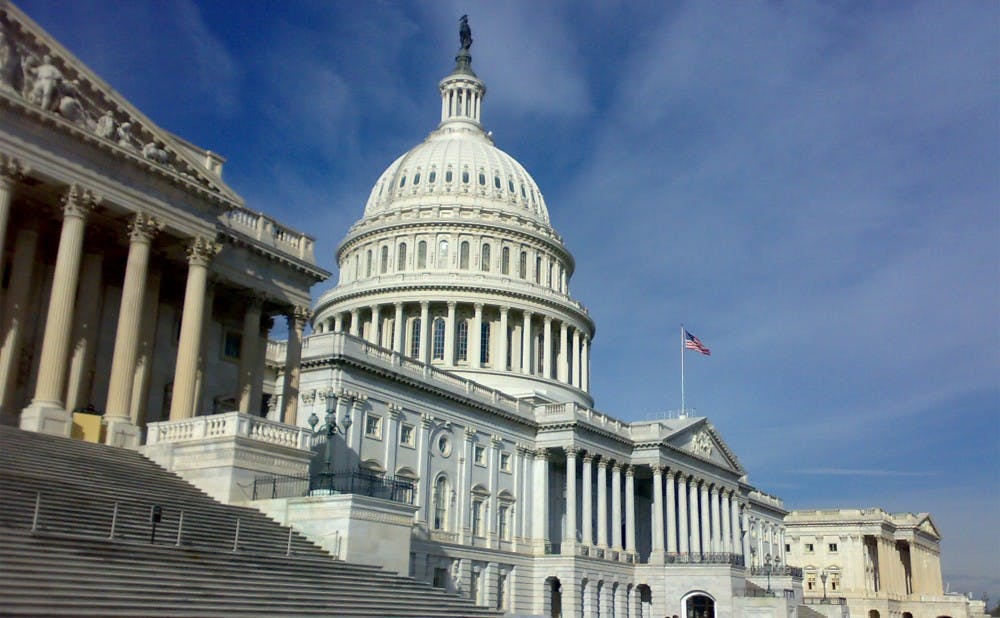The government shutdown drags long into its third week as President Donald Trump and congressional Democrats square off about spending billions of dollars on a border wall.
Duke has been largely unaffected by the shutdown so far, but that is likely to change if the government stays partially closed.
“We’re keeping an eye on it. Right now, as of this particular moment, we’re not seeing any significant impact,” said Michael Schoenfeld, vice president for public affairs and government relations, Monday. “We expect that if it goes much longer, there will potentially be questions about payments of grants and other ordinary business transactions.”
David Rohde, Ernestine Friedl professor of political science, laid out the political calculations lawmakers are facing right now. As Trump plays to his base by pushing for a wall at the cost of shutting down the government, Democrats are focused on the center of the electorate, which does not want a wall or a shutdown, the professor said.
“The problem with this one is that the two sides are targeting different parts of the electorate," he explained. "So, if they focus on that part of the electorate, it’s possible that neither is being damaged, at least in the terms the party is focused on.”
The partial government shutdown began the morning of Dec. 22 at midnight, and going into day 19 on Wednesday, is the second longest in United States history. The longest began in December 1995 and lasted 21 days. The current stall marks the third shutdown of 2018—one occurred in January and another in February.
The 1995 shutdown came to an end when Republicans—trying to cut spending and limit the size of government—realized they were on the losing end of public opinion to former President Bill Clinton and Democrats and gave in. An earlier 2018 shutdown was resolved when Democrats—pushing for protection for DACA recipients—found themselves on the wrong end of public opinion, Rohde said.
But because the two sides are focused on separate parts of the electorate, their versions of political success are not mutually exclusive, he explained.
“I don’t know that there is a path forward. Until something changes about the situation that I described, I don’t see any grounds for a resolution," Rohde said. "I think the expectation of most analysts would be that, assuming they were to agree with the way I have characterized things, that it would be Trump who would eventually back down because his situation would quite probably lead to his defeat. But I don’t know that he would agree with that calculation, and if he doesn’t, then he has no reason to change.”
Despite limited implications for Duke currently, the shutdown complicates matters for the 800,000 federal employees it affects. This ranges from 6,000 Secret Service agents and members of the Transportation Security Agency, which manages airport security screenings, to the Securities and Exchange Commission employees going unpaid.
With the National Park Service closed, trash has been shown overflowing at some of the parks that remained open without staff. Initially, the Internal Revenue Service was not issuing tax refunds during the shutdown, but the Trump administration directed them to Monday, despite the previous policy.
"The federal government remains shut down for one reason, and one reason only, because Democrats will not fund border security," Trump said in an address Tuesday night. "My administration is doing everything in our power to help those impacted by the situation, but the only solution is for Democrats to pass a spending bill that defends our borders and reopens the government."
Rohde added that this gridlock on the hill is likely a preview of the next two years of politically split houses of Congress.
“It is very likely to be two years of extremely low government productivity," he said.
But on campus, the effects so far have been minimal.
“Things like student aid are not affected by the shutdown,” Schoenfeld said. “So the disbursement of Pell grants, of student loans, of things like that are still on track.”
The biggest change is related to hiring practices, he added, as E-Verify and similar services are inoperable while the government is partially closed.
“It will just extend some hiring processes. We’re also keeping an eye on things like immigration and visas,” Schoenfeld said. “If the State Department is closed, then we run into challenges especially as people are coming back and forth.”
But that’s if the shutdown continues.
“All of this is in the way of speculative,” he added. “Right now, the direct impact on Duke has not been notable. But we expect that will likely change over time.”
Get The Chronicle straight to your inbox
Signup for our weekly newsletter. Cancel at any time.
Bre is a senior political science major from South Carolina, and she is the current video editor, special projects editor and recruitment chair for The Chronicle. She is also an associate photography editor and an investigations editor. Previously, she was the editor-in-chief and local and national news department head.
Twitter: @brebradham
Email: breanna.bradham@duke.edu

